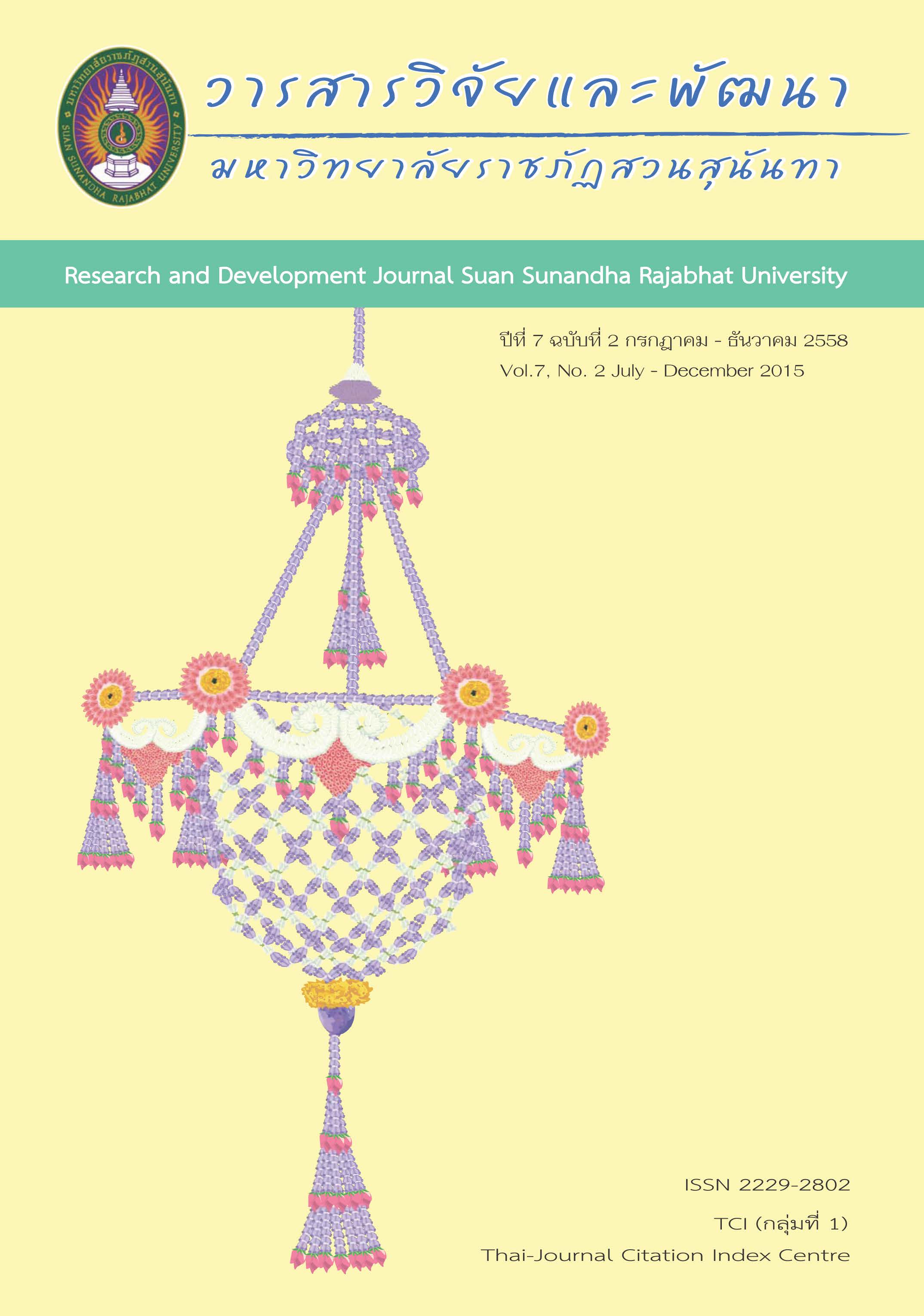การพัฒนาจิตเบญจลักษณ์เพื่ออนาคตของเด็กปฐมวัย
คำสำคัญ:
จิตเบญจลักษณ์เพื่ออนาคตของเด็กปฐมวัย, จิตแห่งวิทยาการ, จิตแห่งการสังเคราะห์; จิตแห่งการสร้างสรรค์; จิตแห่งการเคารพ; จิตแห่งจริยธรรมบทคัดย่อ
การวิจัยนี้มีวัตถุประสงค์เพื่อพัฒนา จิตเบญจลักษณ์เพื่ออนาคตของเด็กปฐมวัย ใช้แนวคิดจิตเบญจลักษณ์เพื่ออนาคตของ Gardner (2009) ที่ประกอบด้วยจิต 5 ลักษณะ ได้แก่ จิตแห่งวิทยาการ จิตแห่งการสังเคราะห์ จิตแห่งการสร้างสรรค์ จิตแห่งการเคารพ และจิตแห่งจริยธรรม เป็นฐานในการวิจัย กลุ่มตัวอย่างที่ใช้คือนักเรียนอนุบาล (อายุ 5-6 ปี) จำนวน 129 คน ของโรงเรียนในสังกัดสำนักงานเขตพื้นที่การศึกษาประถม ศึกษานครราชสีมา เขต 1-7 ภาคเรียนที่ 2 ปีการศึกษา 2557 จำนวน 7 โรงเรียนจากการเลือกแบบเจาะจงและยินดีเข้าร่วมวิจัย เครื่องมือที่ใช้คือ รูปแบบการเรียน การสอนสำหรับพัฒนาจิตเบญจลักษณ์เพื่ออนาคตของเด็กปฐมวัย (หรือ MINDS instructional model) ที่ประกอบด้วยหลักการ 6 ข้อคือ การเรียนรู้จากการสังเกต การปรับมโนทัศน์ การลงมือปฏิบัติ การมีปฏิสัมพันธ์ การประเมินค่า และการเสริมแรง โดยมีขั้นตอนของรูปแบบการเรียนการสอน 5 ขั้นคือ กระตุ้นการเรียนรู้ (Motivating: M) พินิจพิเคราะห์ (Inquiring: I) กำหนดบรรทัดฐาน (Norming: N) ปฏิบัติร่วมกัน (Doing together: D) และแลกเปลี่ยนเรียนรู้ (Sharing: S) สำหรับการวิเคราะห์ข้อมูลใช้การทดสอบค่าที ผลวิจัยพบว่าหลังได้รับการจัดประสบการณ์ตามรูปแบบการเรียนการสอนสำหรับพัฒนาจิตเบญจลักษณ์เพื่ออนาคตของเด็กปฐมวัย ค่าเฉลี่ยจิตเบญจลักษณ์เพื่ออนาคตของเด็กปฐมวัยในทุกโรงเรียนสูงขึ้นอย่างมีนัยสำคัญทางสถิติที่ระดับ .01 แสดงว่าการจัดประสบการณ์ตามรูปแบบการเรียนการสอนที่สร้างขึ้นสามารถพัฒนาจิตเบญจลักษณ์เพื่ออนาคตของเด็กปฐมวัยให้สูงขึ้นได้
เอกสารอ้างอิง
Arbuthnot, J. & Faust, D. (1998). Teaching moral reasoning: Theory and practice (S. Boonaree, Trans.). Bangkok: Department of Curriculum and Instruction Development.
Bandura, A. (1977). Social learning theory. Englewood Cliffs, NJ: Prentice-Hall.
Bandura, A. (1986). Social foundations of thought and action: A social cognitive theory. Englewood Cliffs, NJ: Prentice-Hall.
Boonanantabut, M. (2007). The development of MCCP learning for preschool children (Doctoral Dissertation). Srinakharinwirot University, Thailand.
Boonyanusit, K. (2011). Development of an instructional model for enhancing respectful mind and ethical mind based on teaching and learning via service learning for undergraduate students (Doctoral Dissertation). Srinakharinwirot University, Thailand.
Choksathid, T. & Thaithani, P. (2015). The first subproject research report: A study of factors of early childhood’s five minds for the future. Nakhon Ratchasima: Nakhon Ratchasima Rajabhat University.
Duenchay, C. (2011). Effects of using IMSTRA instructional model on concepts of basic units of living things and plant existence process and synthesizing thinking ability of lower secondary school students (Master’s thesis). Chulalongkorn University, Thailand.
Gardner. H. (2009). Five minds for the future. Boston: Harvard Business Review Press.
Johnson, D. & Johnson, R. (1998). Learning together and alone: Cooperative, competitive, and individualistic learning (5th ed.). Boston: Allyn & Bacon.
Joyce, B. & Weil, M. (2000). Models of teaching (6th ed.). Cambridge, MA: Allyn & Bacon.
Ketunuti, K. (2014). The development of B-R-A-I-N learning model for promoting critical thinking ability of young children (Doctoral dissertation). Srinakharinwirot University, Thailand.
Khammani, T. (2013). Teaching science: The body of knowledge for effective learning process (17th ed.). Bangkok: Chulalongkorn University Press.
Khammani, T. (2003). The development of ethics and values: From theory to practice. Bangkok: Metheetips.
Maikeaw, B. (2011). The development of IDRA instructional model to developing moral for young children (Doctoral dissertation). Srinakharinwirot University, Thailand.
Munsettavith, C. (2014). A study of factors and enhancement desirable characteristic of living together with peace and happiness appropriate for preschool in three southern border provinces through SANTISUK experiential learning model (Doctoral dissertation). Srinakharinwirot University, Thailand.
Nualpang, K. (2011). A development of an instructional model for enhancing discipline mind, synthesizing mind and creating mind respectful mind for undergraduate students at the Faculty of Education, Burapha University (Doctoral dissertation). Srinakharinwirot University, Thailand.
Office of the Basic Education Commission. (2004). Guide for early childhood education curriculum 2003 (for children 3-5 years old). Bangkok: Kurusapa Latpraw Printer.
Office of the Basic Education Commission. (2014). Statistics in education. Bangkok: Author.
Palintorn, N. (2011). A development of PICC instructional model to promote young children’s knowledge construction skill (Doctoral dissertation). Srinakharinwirot University, Thailand.
Piaget, J. (1980). Adaptation and intelligence: Organic selection and phenocopy (S. Earmes, Trans.). Chicago: University of Chicago Press.
Pinyoanuntapong, S. (2007). Early childhood education. Bangkok: Suan Dusit Rajabhat University.
Siriwannabut, P. (2013). Theories of developmental psychology (6th ed.). Bangkok: Chulalongkorn University Press, Thailand.
Skinner, B. (1990). The behavior of organisms: An experimental analysis. Englewood Cliffs, NJ: Prentice-Hall.
Slavin, R. (1994). Cooperative learning (2nd ed.). New York: Pearson.
Suwannasri, N. (2013). The development of 4M learning model for reasoning thinking skill of young children (Doctoral dissertation). Srinakharinwirot University, Thailand.
Thaithani, P. (2012). Psychology of human learning. Nakhon Ratchasima: Nakhon Ratchasima Rajabhat University.
Vygotsky, L. (1962). Thought and language (E. Haufmann & G. Vakar, Eds. and Trans.). Cambridge, MA: MIT Press.
Weiss. N. (1995). Introduction statistics. New York: Addison-Wesley.
Yoosook, W. (2012). Development of mathematical reasoning ability and creativity of tenth-grade students using mathematical extra-curricular activities and experiential learning cycle (Master’s thesis). Chulalongkorn University, Thailand.
ดาวน์โหลด
เผยแพร่แล้ว
รูปแบบการอ้างอิง
ฉบับ
ประเภทบทความ
สัญญาอนุญาต
บทความที่ได้รับการตีพิมพ์เป็นลิขสิทธิ์ของ สถาบันวิจัยและพัฒนา มหาวิทยาลัยราชภัฎสวนสุนันทา
ข้อความที่ปรากฏในบทความแต่ละเรื่องในวารสารวิชาการเล่มนี้เป็นความคิดเห็นส่วนตัวของผู้เขียนแต่ละท่านไม่เกี่ยวข้องกับมหาวิทยาลัยราชภัฎสวนสุนันทา และคณาจารย์ท่านอื่นๆในมหาวิทยาลัยฯ แต่อย่างใด ความรับผิดชอบองค์ประกอบทั้งหมดของบทความแต่ละเรื่องเป็นของผู้เขียนแต่ละท่าน หากมีความผิดพลาดใดๆ ผู้เขียนแต่ละท่านจะรับผิดชอบบทความของตนเองแต่ผู้เดียว





